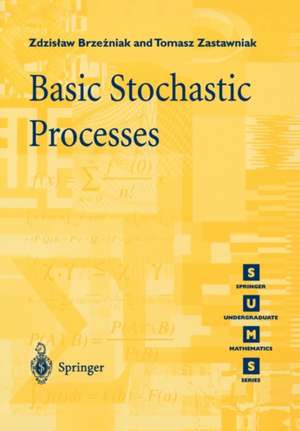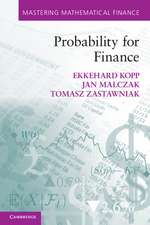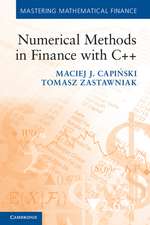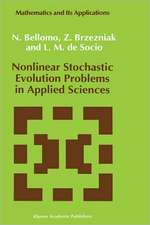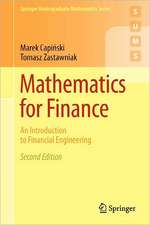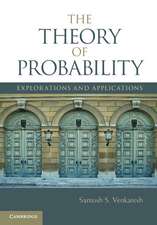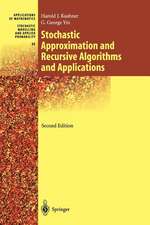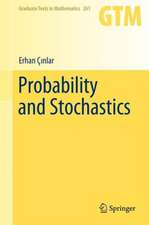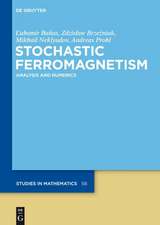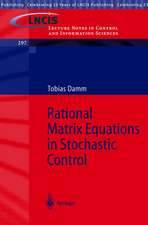Basic Stochastic Processes: A Course Through Exercises: Springer Undergraduate Mathematics Series
Autor Zdzislaw Brzezniak, Tomasz Zastawniaken Limba Engleză Paperback – 16 oct 1998
Din seria Springer Undergraduate Mathematics Series
-
 Preț: 319.02 lei
Preț: 319.02 lei -
 Preț: 301.10 lei
Preț: 301.10 lei -
 Preț: 237.18 lei
Preț: 237.18 lei -
 Preț: 238.28 lei
Preț: 238.28 lei -
 Preț: 325.20 lei
Preț: 325.20 lei -
 Preț: 224.54 lei
Preț: 224.54 lei -
 Preț: 319.90 lei
Preț: 319.90 lei -
 Preț: 236.97 lei
Preț: 236.97 lei -
 Preț: 240.63 lei
Preț: 240.63 lei -
 Preț: 358.53 lei
Preț: 358.53 lei -
 Preț: 283.11 lei
Preț: 283.11 lei -
 Preț: 221.92 lei
Preț: 221.92 lei -
 Preț: 237.29 lei
Preț: 237.29 lei -
 Preț: 359.65 lei
Preț: 359.65 lei -
 Preț: 265.90 lei
Preț: 265.90 lei -
 Preț: 236.87 lei
Preț: 236.87 lei -
 Preț: 358.81 lei
Preț: 358.81 lei -
 Preț: 229.86 lei
Preț: 229.86 lei -
 Preț: 268.36 lei
Preț: 268.36 lei -
 Preț: 166.75 lei
Preț: 166.75 lei -
 Preț: 239.86 lei
Preț: 239.86 lei -
 Preț: 266.70 lei
Preț: 266.70 lei -
 Preț: 269.99 lei
Preț: 269.99 lei - 15%
 Preț: 526.67 lei
Preț: 526.67 lei -
 Preț: 272.49 lei
Preț: 272.49 lei -
 Preț: 320.20 lei
Preț: 320.20 lei -
 Preț: 265.18 lei
Preț: 265.18 lei -
 Preț: 275.36 lei
Preț: 275.36 lei -
 Preț: 278.24 lei
Preț: 278.24 lei -
 Preț: 272.69 lei
Preț: 272.69 lei -
 Preț: 258.88 lei
Preț: 258.88 lei -
 Preț: 265.81 lei
Preț: 265.81 lei -
 Preț: 266.70 lei
Preț: 266.70 lei -
 Preț: 275.74 lei
Preț: 275.74 lei -
 Preț: 328.08 lei
Preț: 328.08 lei -
 Preț: 265.78 lei
Preț: 265.78 lei -
 Preț: 275.74 lei
Preț: 275.74 lei -
 Preț: 273.45 lei
Preț: 273.45 lei -
 Preț: 277.32 lei
Preț: 277.32 lei -
 Preț: 270.57 lei
Preț: 270.57 lei -
 Preț: 273.63 lei
Preț: 273.63 lei -
 Preț: 270.19 lei
Preț: 270.19 lei -
 Preț: 265.36 lei
Preț: 265.36 lei -
 Preț: 265.36 lei
Preț: 265.36 lei -
 Preț: 268.08 lei
Preț: 268.08 lei -
 Preț: 272.86 lei
Preț: 272.86 lei -
 Preț: 272.69 lei
Preț: 272.69 lei -
 Preț: 271.16 lei
Preț: 271.16 lei -
 Preț: 270.74 lei
Preț: 270.74 lei
Preț: 237.41 lei
Nou
45.43€ • 47.43$ • 37.60£
Carte disponibilă
Livrare economică 14-28 martie
Livrare express 27 februarie-05 martie pentru 27.91 lei
Specificații
ISBN-10: 3540761756
Pagini: 236
Ilustrații: X, 226 p.
Dimensiuni: 178 x 235 x 12 mm
Greutate: 0.41 kg
Ediția:1999
Editura: SPRINGER LONDON
Colecția Springer
Seria Springer Undergraduate Mathematics Series
Locul publicării:London, United Kingdom
Public țintă
Lower undergraduateCuprins
1. Review of Probability.- 1.1 Events and Probability.- 1.2 Random Variables.- 1.3 Conditional Probability and Independence.- 1.4 Solutions.- 2. Conditional Expectation.- 2.1 Conditioning on an Event.- 2.2 Conditioning on a Discrete Random Variable.- 2.3 Conditioning on an Arbitrary Random Variable.- 2.4 Conditioning on a ?-Field.- 2.5 General Properties.- 2.6 Various Exercises on Conditional Expectation.- 2.7 Solutions.- 3. Martingales in Discrete.- 3.1 Sequences of Random Variables.- 3.2 Filtrations.- 3.3 Martingales.- 3.4 Games of Chance.- 3.5 Stopping Times.- 3.6 Optional Stopping Theorem.- 3.7 Solutions.- 4. Martingale Inequalities and Convergence.- 4.1 Doob’s Martingale Inequalities.- 4.2 Doob’s Martingale Convergence Theorem.- 4.3 Uniform Integrability and L1 Convergence of Martingales.- 4.4 Solutions.- 5. Markov Chains.- 5.1 First Examples and Definitions.- 5.2 Classification of States.- 5.3 Long-Time Behaviour of Markov Chains: General Case.- 5.4 Long-Time Behaviour of Markov Chains with Finite State Space.- 5.5 Solutions.- 6. Stochastic Processes in Continuous Time.- 6.1 General Notions.- 6.2 Poisson Process.- 6.2.1 Exponential Distribution and Lack of Memory.- 6.2.2 Construction of the Poisson Process.- 6.2.3 Poisson Process Starts from Scratch at Time t.- 6.2.4 Various Exercises on the Poisson Process.- 6.3 Brownian Motion.- 6.3.1 Definition and Basic Properties.- 6.3.2 Increments of Brownian Motion.- 6.3.3 Sample Paths.- 6.3.4 Doob’s Maximal L2 Inequality for Brownian Motion.- 6.3.5 Various Exercises on Brownian Motion.- 6.4 Solutions.- 7. Itô Stochastic Calculus.- 7.1 Itô Stochastic Integral: Definition.- 7.2 Examples.- 7.3 Properties of the Stochastic Integral.- 7.4 Stochastic Differential and Itô Formula.- 7.5 Stochastic Differential Equations.- 7.6 Solutions.
Recenzii
The Times Higher Education Supplement
This is probably one of the best books to begin learning about the sometimes complex topic of stochastic calculus and stochastic processes from a more mathematical approach. Some literature are often accused of unnecessarily complicating the subject when applied to areas of finance. With this book you are allowed to explore the rigorous side of stochastic calculus, yet maintain a physical insight of what is going on. The authors have concentrated on the most important and useful topics that are encountered in common physical and financial systems
www.quantnotes.com
Caracteristici
Strong emphasis on self-study
Descriere
This book has been designed for a final year undergraduate course in stochastic processes. It will also be suitable for mathematics undergraduates and others with interest in probability and stochastic processes, who wish to study on their own. The main prerequisite is probability theory: probability measures, random variables, expectation, independence, conditional probability, and the laws of large numbers. The only other prerequisite is calculus. This covers limits, series, the notion of continuity, differentiation and the Riemann integral. Familiarity with the Lebesgue integral would be a bonus. A certain level of fundamental mathematical experience, such as elementary set theory, is assumed implicitly. Throughout the book the exposition is interlaced with numerous exercises, which form an integral part of the course. Complete solutions are provided at the end of each chapter. Also, each exercise is accompanied by a hint to guide the reader in an informal manner. This feature will be particularly useful for self-study and may be of help in tutorials. It also presents a challenge for the lecturer to involve the students as active participants in the course.
